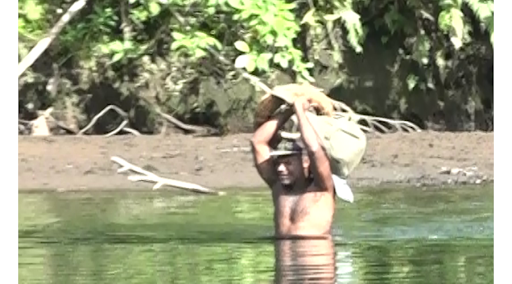In the past year the Solomon Islands had many tragic incidents to report and I felt deep personal sadness reading of incidents involving the loss of life but a story by Allen Waitara written in June 2020 and shared by the SIBC left its mark and has stayed with me.
I will quote Allen’s story and very much hope the situation he described 7 months ago has been attended to by the provincial or central government and we will no longer need to read of the loss of innocent lives of children when seeking to get medical care.
Quote.
"About sixty children from this village have died before reaching the nearest health centre.”
Walking long hours on rocks and crossing rivers just to access basic healthcare services is a struggle all mothers and children around the globe do not deserve.
But this has become a daily challenge for mothers and children of Nagau Village in West Wainoni, Makira Ulawa Province, Solomon Islands.
There is no alternatives, but rather to cross rivers and exposed to harsh weather conditions before accessing to basic health services.
Nagau, is a village situated 14.5 Kilometers upstream of Warihito River and is enclosed by mountains and tropical rainforest with a population of around 300 people.
The village’s only health centers are Maerongasia clinic of around 6 km downstream of Warihito River, and Narame Clinic, Wainoni Coast, about 15km away.
To to access to these clinics, one has to trek down narrow tracks, crossing Warihito River, and walking on rough and rocky paths.
This is also the only pathway to accessing the world outside their home, whether for marketing, school, holidays, or looking for job outside.
. On a number of occasions when I was sick, my sons and daughters really struggled to take me to Narame Clinic and Maerongasia .” Mr. Mae said.
“If we fail to take our patients to these clinics, we expect them to die whether at home or along the way,” he said.
Mr. Mae questioned, why the government had turned a blind eye on them on the issue.
A mother also from Nagau village, Mrs Alice Tora said, they were experiencing a very difficult life.
” Nagau is situated in land, so taking patients to a clinic, especially babies takes us about 3 to 4 hours,”
” But since we are living beside big rivers, when it is rain, mothers are really struggling to take their children to the clinics,” Mrs Tora emphasized.
“We always build rafts to take sick patients to the clinic,” She said.
The local Primary Teacher said, recently, the Rural Development Program (RDP) built a clinic at their village but up until now, there is no health worker posted to the clinic.
A possible reason is the lack of proper staff housing.
Mrs Tora further said, life would not be so difficult if proper road infrastructure was built to reach their village.
Another Mother from Naopaworo Village on the highlands of Warihito area, Teresia Kagiro shared similar sentiments, describing their struggle as real.
“I’m from Naopaworo village, which is up in the mountains. Every time we want to access health services, we must walk down the hills for hours and cross the Warihito River before accessing health services,”
“And after we visit the clinics, we walked up the hills to our village again” Mrs Kagiro said.
The United Nation through its Sustainable Development Goals (SDGs), the SDG 3 has clearly spelled out that “ensuring healthy lives and promoting well-being at all ages is essential to sustainable development.
The United Nation also made a bold commitment that by 2030, it should end the epidemics of AIDS, tuberculosis, malaria and other communicable diseases.
It also aims to achieve universal health coverage, and provide access to safe and effective medicines and vaccines for all. “
Meanwhile, residents of Wariki village, Sumaro and Makohigo also on Warihito area, shared the same concerns that accessing health services is a big challenge in their area.
End of quote.
Footnote.
The United Nation made a bold commitment that by 2030, it should end the epidemics of AIDS, tuberculosis, malaria and other communicable diseases.
It also aims to achieve universal health coverage, and provide access to safe and effective medicines and vaccines for all.
Yours sincerely
Frank Short



